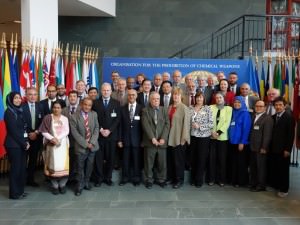The IUPAC Bureau and Executive Committee have approved a request from the Organization for the Prohibition of Chemical Weapons, OPCW, to endorse and promote the Hague Ethical Guidelines.
The Hague Ethical Guidelines are intended to serve as elements for ethical codes and discussion points for ethical issues related to the practice of chemistry under the Chemical Weapons Convention. The core element of the guidelines, which is based on the premise that “achievements in the field of chemistry should be used to benefit humankind and the environment,” is fully consistent with IUPAC’s strategic mission and vision.

In 2015, a group of chemical practitioners from around the world, including several chemists with experience as volunteers in IUPAC, met in The Hague to formulate this set of ethical guidelines.
IUPAC has partnered with the OPCW on several important initiatives, including conferences on the impact of scientific developments on the Chemical Weapons Convention, on materials for education and outreach on dual uses of chemicals, and on preparation of the Guidelines. Additionally, a recent IUPAC project on recommendations for codes of conduct for chemists follows a similar model for promulgation of codes, encouraging its members to consider the guidelines in updating and preparing codes of conduct for their organizations.
IUPAC encourages all of its member National Adhering Organizations, Associated Organizations, Company Associates, volunteers, fellows and affiliates to take note of the Hague Ethical Guidelines and IUPAC’s guidelines in their daily work and in the review and preparation of codes of conduct and guidelines for their home institutions and organizations.
> Access the Hague Ethical Guidelines brochure directly from the OPCW website @ https://www.opcw.org/special-sections/science-technology/the-hague-ethical-guidelines/
Links & Refs
– OPCW Announcement of IUPAC’s endorsement of the Hague Ethical Guidelines (posted 2 May 2016, on OPCW Day) and the Letter from IUPAC President to OPCW Director-General [PDF – 200 KB]
– IUPAC project on guidelines for codes of conduct (project 2007-022-2-020) and outcome Why Codes of Conduct Matter published in Chem. Int. Nov 2011, p 7 (doi 10.1515/ci.2011.33.6.7)
– IUPAC, OPCW, and the Chemical Weapons Convention, by Leiv Sydnes, Chem. Int. July 2013, p. 4 (doi 10.1515/ci.2013.35.4.4)
– IUPAC and OPCW Working Toward Responsible Science, by Peter Mahaffy, Joseph Zondervan, Alastair Hay, Daniel Feakes, and Jonathan Forman, Chem. Int. Sep 2014, p. 9 (doi 10.1515/ci-2014-0508)
– Science, Disarmament, and Diplomacy in Chemical Education: The Example of the Organisation for the Prohibition of Chemical Weapons (OPCW) – 2016 Spring ConfChem Open Access Online Conference from 2 May – 1 July 2016
– Updating, Piloting, and Disseminating Educational Material for Raising Awareness of the Multiple Uses of Chemicals and the Chemical Weapons Convention (iupac.org/project/2013-020-1-050)
